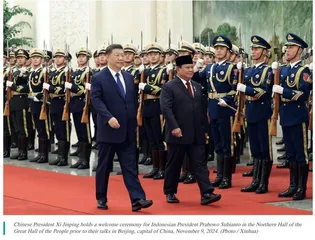Development Path with Asian Characteristics:Asia’s Answer amid Once-in-a-Century Changes
作者: Liu Jianchao

At the beginning of the new year, we celebrate the arrival of 2025. Unfortunately, not everyone in the world shares such joy and peace. Many, instead, are mired in turmoil, conflict, and bloodshed. In 2024 alone, over 233,000 lives perished in the flames of war.
In many ways, Asia has been fortunate. Since the end of World War II, we in Asia have largely enjoyed peace and stability, making steady progress towards prosperity through hard work. A large part of this success is that, in Asia, we have found a development path rooted in Asian values: independence, mutual respect, equality and consensus, openness and inclusiveness. Thanks to this path, we are gradually turning the “Asian Century” from a dream to a reality. In this turbulent world full of instability and uncertainty, we must stay on this path, stay the “Asian Way”.
To stay on this path, we must prioritize peace and stability. As President Xi Jinping put it, peace, like air and sunshine, is hardly noticed when people are enjoying it, but none of us can live without it. The ongoing Ukraine crisis and the Palestinian-Israeli conflict are stark reminders that peace is fragile and war is destructive. We in Asia must do whatever we can to avoid war and chaos.
We have succeeded in this before and we can do so again thanks to our distinctive “Asian Way”, which highlights mutual respect, consensus building and accommodating each other’s comfort level. The “Asian Way” works because it believes in equality of all countries regardless of their size and strength, and prioritizes consultation and dialogue in searching for solutions acceptable to all parties concerned. President Xi Jinping commended this approach in 2016. In 2022, President Prabowo Subianto, then Minister of Defense, shared the same sentiments at the Shangri-La Dialogue, affirming that we in Asia can address our differences in the “Asian Way”.
To stay on this path, we need to remain independent. History tells us that a country or region cannot revitalize itself if it does not break the shackles of colonialism and gain full independence.
Speaking of independence, for Asians, the first thing that comes to mind is Bandung. The Bandung Asian-African Conference in 1955 marked the beginning of a new era for Asian and African countries, where we took our destiny into our own hands and began to pursue development on our own terms. It was during the Conference that President Sukarno declared that “Wherever, whenever and however it appears, colonialism is an evil thing, and one which must be eradicated from the Earth.” It was also there that Premier Zhou Enlai delivered his famous speech, highlighting that suffering from “the calamities of colonialism” was the common ground for the overwhelming majority of the Asian and African countries.
This year marks the 70th anniversary of the Bandung Conference. The Bandung Spirit has become a corner stone of the norms governing international relations, which is still highly relevant in today’s world, as colonialism has taken new forms. Seventy years ago, the common ground we sought was to shake off colonial rule and achieve national independence. What we seek today is fairness and justice. We are willing to work with all countries to uphold and carry forward the Bandung Spirit in the new era, and keep the future of our country and the destiny of our nation firmly in our own hands.
To stay on this path, we need to focus on development and the well-being of our people. Governments can only win people’s support when they deliver on their promises to achieve growth and prosperity for all. In this regard, China and Indonesia are good cases in point. Giving priority to growing the economy and improving people’s livelihood has won them high approval rates from their peoples. China, under the leadership of President Xi Jinping, has lifted 100 million people out of poverty with eight years of tenacious efforts, achieving the poverty reduction goal of the U.N. 2030 Agenda for Sustainable Development ten years ahead of schedule. Indonesia has also come a long way in improving the lives of its people over the past decade. President Prabowo, right after taking office, wasted no time in launching the Free Nutritious Meal Program, another important step to promote the well-being of the Indonesian people.
China and Indonesia have also had great stories of win-win cooperation. In 2013, President Xi Jinping proposed the vision of the 21st-Century Maritime Silk Road during his speech at Indonesian Parliament. This vision, which was conceived in Indonesia, is now bearing fruit, exemplified by the Jakarta-Bandung high-speed railway. To construct it, $5.1 billion worth of raw materials were sourced locally, boosting the local economy. It has also dramatically reduced the travel time between the two cities from over three hours to just 40 minutes. Many Indonesians have shared the excitement of their first ride on social media.
Looking ahead to 2025, there is a lot more to expect from China-Indonesia cooperation. China is poised to maintain a sound growth momentum. Indonesia, with its National Long-term Development Plan 2025-2045, is aiming for 8% economic growth. Let us align the Chinese modernization drive with the Golden Indonesia 2045 Vision to create even better lives for our two peoples, as we continue working closely to implement the Global Development Initiative.